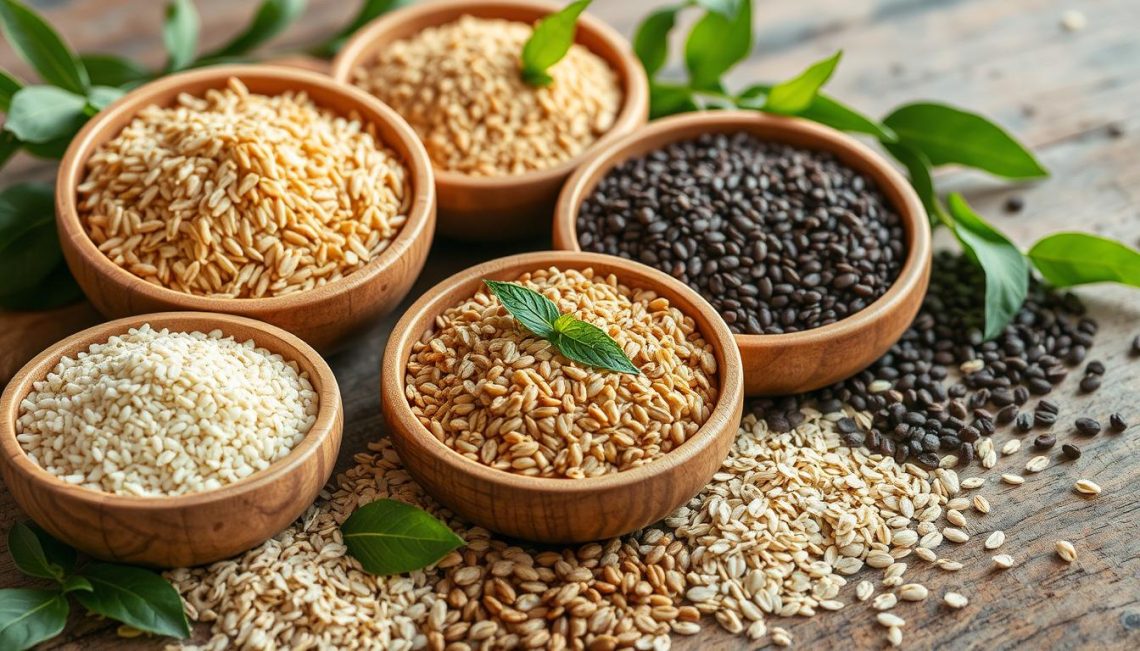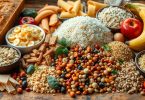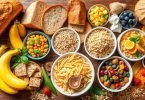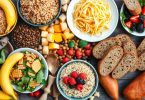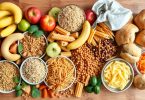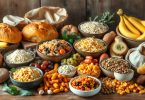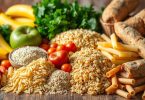In the world of nutrition, carbohydrates are key. They fuel our bodies. But, what are the best carbohydrate-rich foods for lasting energy and health? This guide will show you how to use carbs for energy and to fuel your body.
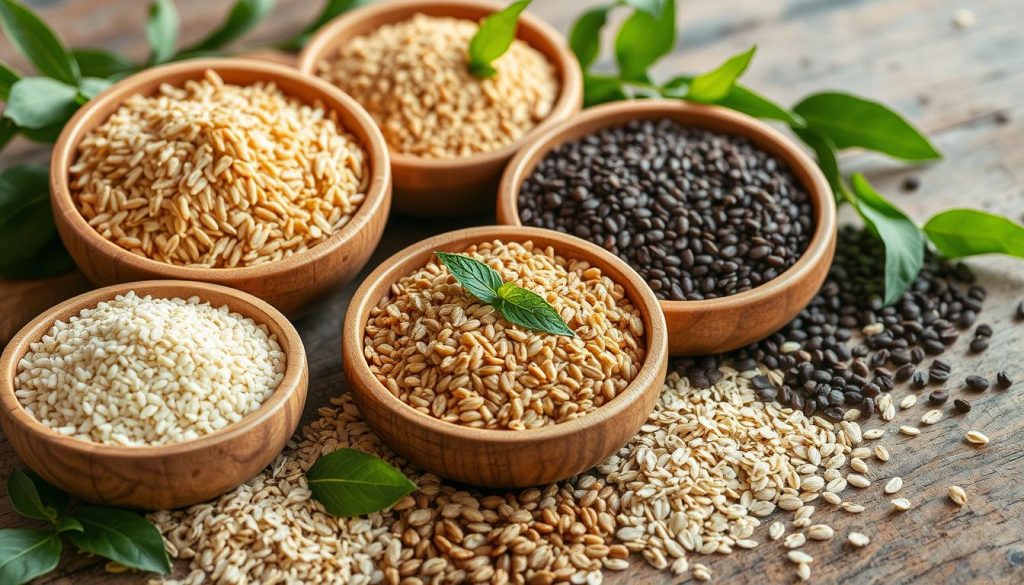
Key Takeaways
- Carbohydrates are the body’s main energy source, powering our functions.
- There are complex and simple carbs, each with benefits.
- Eating a variety of carbs, like whole grains and fruits, keeps energy balanced.
- Moderation and mindful eating are key for health.
- Knowing carbs’ role in activity helps athletes perform better.
Understanding Carbohydrates: The Body’s Primary Energy Source
Carbohydrates are the main energy source for our bodies. They power our daily activities and help us perform physically and mentally. These nutrients are divided into complex carbohydrates and simple carbohydrates. Each type has its own role in our health and well-being.
Complex vs. Simple Carbohydrates
Complex carbohydrates are found in whole grains, legumes, and starchy vegetables. They are made of long chains of simple sugars. This makes them take longer to digest, giving us a steady energy supply.
On the other hand, simple carbohydrates are in sweets, juices, and refined grains. They are quickly broken down, causing a quick rise in blood sugar followed by a drop.
The Role of Carbohydrates in Fueling Physical Activity
Carbohydrates are key for physical activity and exercise. Our muscles use carbohydrate metabolism to make ATP, the energy our cells need. Eating the right mix of complex and simple carbs before, during, and after exercise helps fuel our bodies and aids in recovery.
Knowing the difference between complex and simple carbs helps us make better choices. This way, we can optimize our carb intake and keep our energy levels up all day.
Whole Grains: A Powerhouse of Carbohydrates and Nutrients
Whole grains are a top choice for those looking for carbs. They are full of complex carbs and important nutrients. This makes them great for keeping your energy up and improving your health.
Grains like whole wheat, oats, and quinoa are full of complex carbohydrates. These carbs give you energy all day. Unlike refined grains, whole grains keep their bran and germ. This makes them a nutrient-dense carb source.
- Whole grains are full of dietary fiber. This helps your digestion and keeps your blood sugar stable.
- They also have lots of B vitamins, minerals like magnesium and iron, and antioxidants. These help your body work well.
Adding whole grains to your meals is easy. Try using whole-grain breads and pastas. Enjoy quinoa and brown rice too. There are many ways to get the good carbs from whole foods.
| Whole Grain | Nutrient Profile |
|---|---|
| Whole Wheat | High in fiber, B vitamins, magnesium, and antioxidants |
| Oats | Rich in soluble fiber, beta-glucan, and antioxidants |
| Quinoa | Complete protein source, high in fiber, and packed with minerals |
Eating whole grains regularly is good for you. They give you complex carbs and many nutrients. This helps fuel your body and mind.

Starchy Vegetables: A Delicious Source of Energy
Starchy vegetables like potatoes and sweet potatoes are full of complex carbs. They give you long-lasting energy. Plus, they’re packed with vitamins, minerals, and fiber.
Potatoes: A Versatile and Carbohydrate-Rich Veggie
Potatoes are a top pick for complex carbs. They’re great for energy. You can roast, mash, or bake them in many tasty ways.
They also have vitamin C, potassium, and more good stuff.
Sweet Potatoes: A Nutrient-Dense Carb Option
Sweet potatoes are loaded with complex carbs and nutrients. They’re full of vitamin A, which is good for your eyes and immune system. You can enjoy them in many dishes, like baked fries or roasted cubes.
| Nutrient | Potatoes (1 medium) | Sweet Potatoes (1 medium) |
|---|---|---|
| Calories | 161 | 103 |
| Carbohydrates | 37 g | 24 g |
| Fiber | 3 g | 4 g |
| Vitamin A | 0 IU | 21,907 IU |
| Vitamin C | 28 mg | 4 mg |
Potatoes and sweet potatoes are great for energy. They’re full of complex carbs. Adding them to your diet is a tasty way to fuel up.
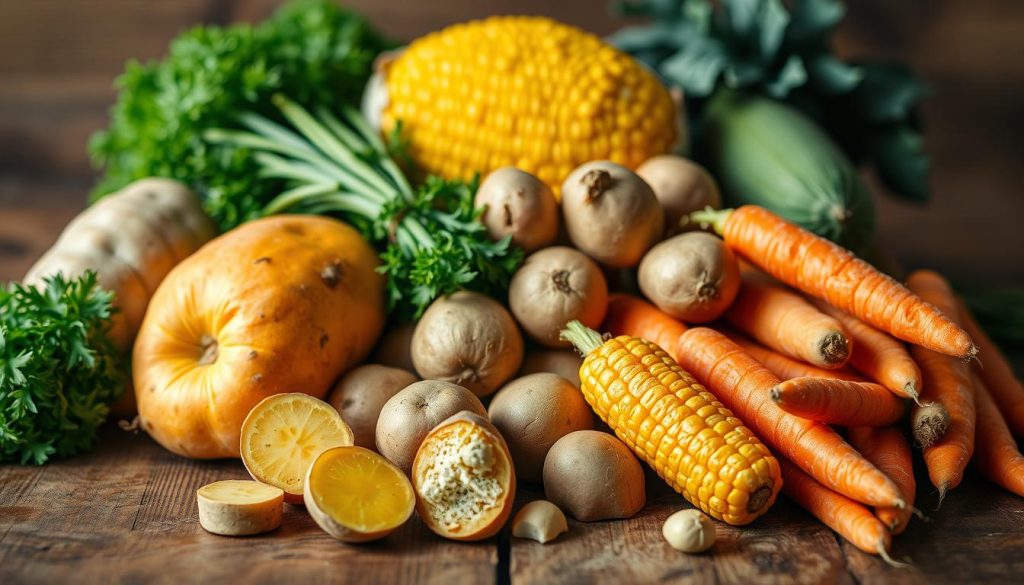
Legumes: Packed with Carbohydrates and Protein
Legumes, like beans, lentils, and chickpeas, are full of complex carbs and protein. They give you lasting energy and lots of important nutrients. These foods are great for your health and wellness.
Beans: A Hearty and Filling Carbohydrate Source
Beans are a standout in the legume family. They are rich in carbohydrates and high-fiber carbs. This makes them a filling and nutritious choice for any diet. You can choose from kidney, black, pinto, or garbanzo beans. Each type offers a lot of carbohydrates and protein to keep you going and feeling full.
- Beans are a good source of complex carbohydrates, providing sustained energy.
- They are rich in protein, which helps support muscle growth and repair.
- Beans are high in fiber, promoting digestive health and regularity.
- Incorporating beans into your meals can help you feel more satisfied and less likely to overeat.
“Beans are a versatile and nutritious food that can be a valuable part of a balanced diet. They offer a unique combination of carbohydrates, protein, and fiber that can provide lasting energy and support overall health.”
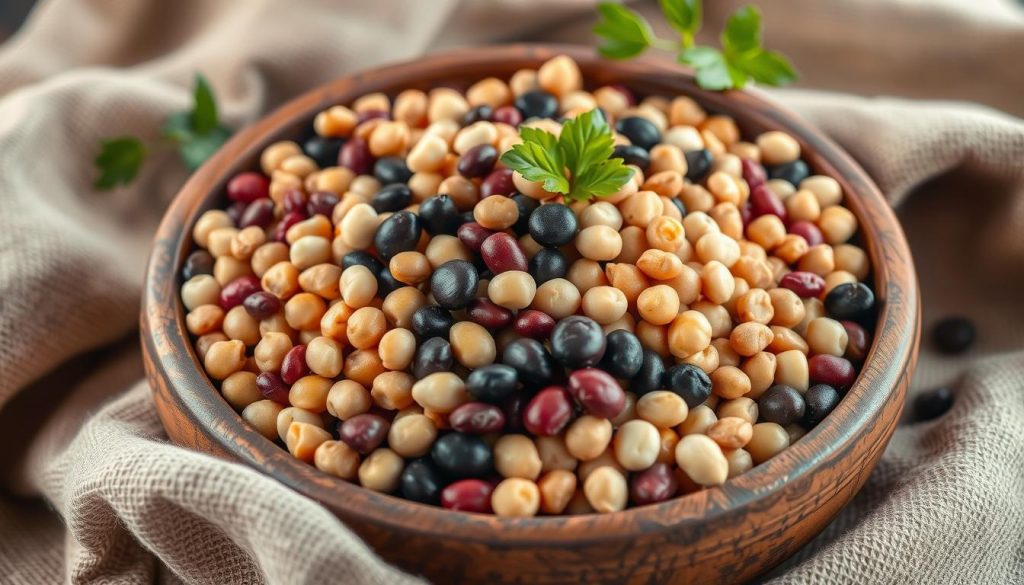
Adding more legumes and beans to your meals is a smart move. They are carbohydrate-rich and protein-packed. This helps fuel your body and supports your overall well-being.
Carbohydrate-Rich Fruits: Nature’s Sweet Treat
Fruits are a natural and delightful source of simple carbohydrates. They can give you a quick energy boost to start your day. From bananas to citrus fruits, nature offers many options. Adding these fruits to your diet can power your body and mind.
Bananas are a great source of natural carbs. They’re often eaten before working out because they give energy for a long time. Berries like blueberries, raspberries, and strawberries are full of fruits high in carbs. They also have antioxidants and fiber for health.
Citrus fruits, like oranges and grapefruits, are full of energy-boosting fruits and simple carbs. They taste great and give you hydration and vitamins.
| Fruit | Carbohydrate Content (per 100g) |
|---|---|
| Banana | 23g |
| Blueberries | 14g |
| Orange | 12g |
| Mango | 17g |
| Pineapple | 13g |
Eating a variety of carbohydrate-rich fruits every day is easy and tasty. They’re great for snacks or smoothies. These natural treats are a key part of a healthy lifestyle.
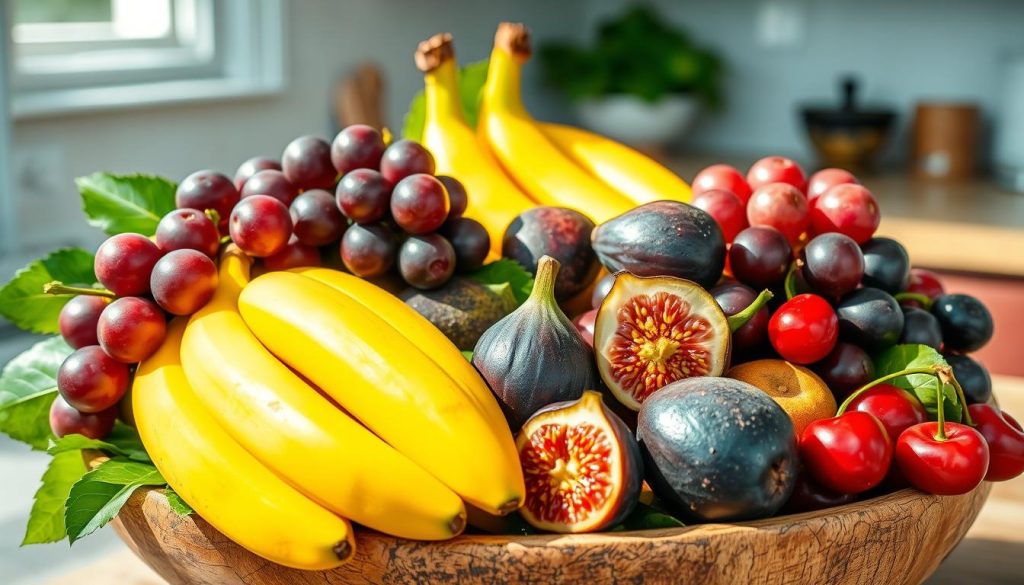
“Fruits are nature’s candy – they’re sweet, they’re juicy, and they’re packed with nutrients that our bodies crave.”
Bread: A Staple Carbohydrate Source
Bread has been a key part of our diet for centuries. It comes in many types, from simple sandwich loaves to fancy whole grain breads. It’s a great source of energy for everyone, no matter their age or how active they are.
Whole Grain Breads: A Nutritious Choice
Whole grain breads are the healthiest option. They keep all parts of the grain, unlike refined breads. This means they’re full of complex carbs, fiber, and important vitamins and minerals.
These breads, made from whole wheat, rye, or oats, are full of complex carbs. They give you energy all day. They also have healthy carb sources like fiber, which helps you feel full and keeps your digestive system healthy.
Compared to refined breads, whole grain breads are more nutritious. They’re a great choice for those who want a healthy carb source to keep them going all day.

“Whole grain breads are a simple and delicious way to incorporate more complex carbohydrates into your diet, providing long-lasting energy and a variety of essential nutrients.”
Pasta: A Beloved Carbohydrate-Rich Food
Pasta is a favorite in many homes. It’s packed with carbs, making it great for energy. Whether it’s spaghetti or penne, pasta is perfect for meals that boost energy.
Pasta is a complex carb, which means it breaks down slowly. This slow release of energy keeps us going all day. Adding pasta to your meals can help keep your energy up.
Pasta comes in many shapes and sizes. You can find whole-grain or gluten-free options. Whole-grain pasta is especially good because it’s full of fiber, which is great for your health.
| Pasta Type | Carbohydrate Content (per 100g) | Fiber Content (per 100g) |
|---|---|---|
| Spaghetti (whole-grain) | 37.5g | 5.5g |
| Penne (regular) | 31.1g | 2.5g |
| Farfalle (gluten-free) | 29.9g | 3.9g |
Adding different pasta dishes to your meals can be fun. You can try tomato sauce, alfredo, or veggie primavera. Pasta is a great way to enjoy complex carbs and explore new flavors.
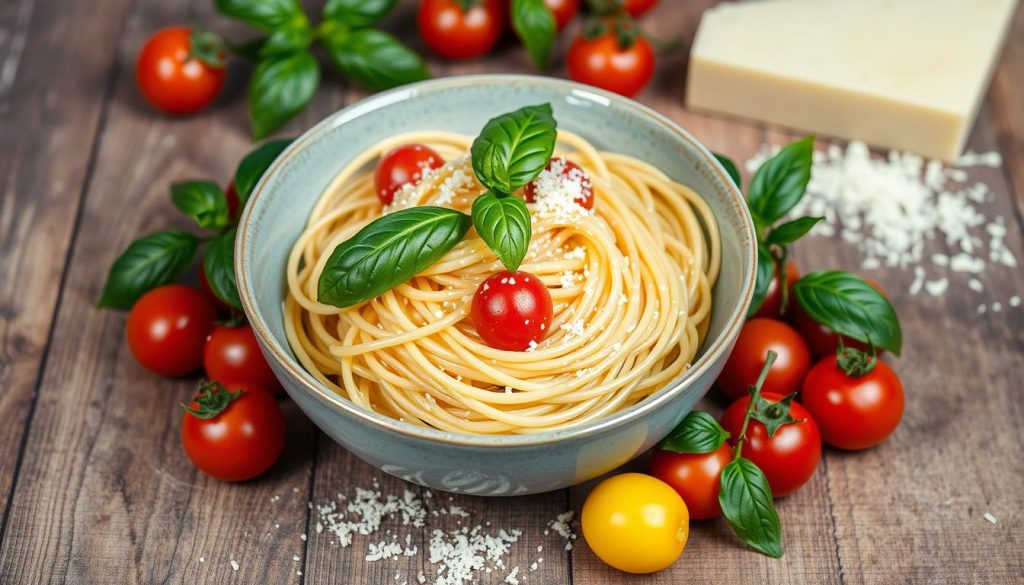
So, when you want a carb-rich meal, choose pasta. It’s full of energy and has endless recipe options. Pasta is a true favorite in the world of carbs.
Rice: A Versatile and Energy-Boosting Grain
Rice is a staple grain that gives us complex carbs and energy. It’s eaten all over the world and is great for meals and snacks. Brown rice is especially good, with lots of health benefits.
Brown Rice: A Fiber-Rich Carbohydrate Option
Brown rice keeps the good parts of the grain, unlike white rice. It’s full of complex carbs and high-fiber carbs. These carbs give you energy slowly.
Brown rice also has vitamins, minerals, and antioxidants. It’s packed with fiber, which helps with digestion and keeps you full. This makes it good for your weight and health.
| Nutrient | Brown Rice | White Rice |
|---|---|---|
| Fiber (g per cup, cooked) | 3.5 | 0.6 |
| Magnesium (mg per cup, cooked) | 84 | 19 |
| Selenium (mcg per cup, cooked) | 19 | 12 |
Eating brown rice boosts your complex carbs and high-fiber carbs. It gives you energy for a long time and is good for your health.
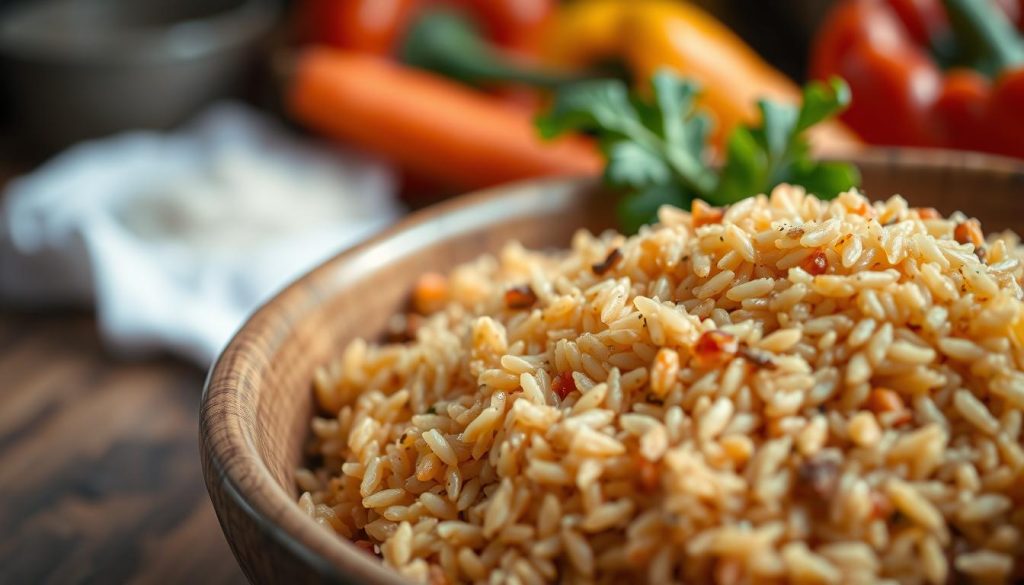
“Brown rice is a powerhouse of complex carbohydrates and fiber, offering long-lasting energy and a host of nutritional benefits.”
Cereals: A Convenient and Carbohydrate-Packed Breakfast
Cereals are a favorite breakfast choice, full of carbs for a quick energy boost. You can pick from classic corn flakes, hearty oats, or crunchy granola. These foods are both healthy and filling.
Different cereals have different carbs. Some have whole grains for lasting energy, while others have simple sugars for a quick rise and fall in blood sugar.
| Cereal Type | Carbohydrate Profile | Nutritional Benefits |
|---|---|---|
| Oatmeal | Complex carbohydrates, high in fiber | Provides sustained energy, supports heart health, and promotes feelings of fullness |
| Whole Grain Cereal | Complex carbohydrates, high in fiber | Delivers a steady supply of energy, helps maintain blood sugar levels, and offers a range of essential nutrients |
| Granola | Mix of complex and simple carbohydrates | Can provide a satisfying crunch and a boost of energy, but may also contain added sugars |
Choose whole grain and high-fiber cereals for a healthy carb choice. They keep you full and energized. Adding milk, yogurt, or fruit makes your breakfast even better.
Looking for a quick energy food or a hearty cereals-based meal? There are many options to start your day right.
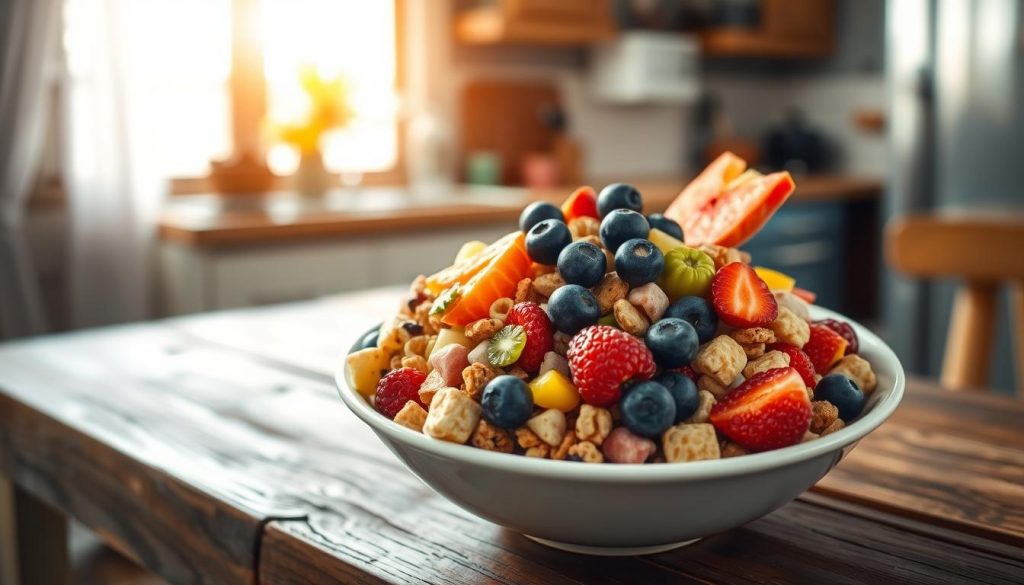
Carbohydrate-Rich Foods: Your Guide to Energy
Carbohydrates are the main energy source for our bodies. Adding different types of carbs to your diet can boost your energy. Foods like whole grains, starchy veggies, legumes, and fruits are full of carbs for energy.
Whole grains like oats, quinoa, and brown rice are great for energy. They’re rich in fiber, vitamins, and minerals. This keeps you full and energized. Starchy vegetables like potatoes and sweet potatoes also give long-lasting energy.
Legumes, such as beans, are packed with carbs and protein. They’re filling and nutritious. Fruits are high in simple carbs, perfect for a quick energy boost.
Eating a variety of these carbohydrate-rich foods helps your body get the energy it needs. This supports your daily activities and health.

“Carbohydrates are the body’s primary source of fuel, and choosing the right carbohydrate-rich foods can make all the difference in providing lasting energy and supporting overall health.”
Moderation is Key: Balancing Carbohydrate Intake
Carbohydrates are vital for energy. But, it’s important to eat them in the right amount. Finding the balance between carbs, portion control, and mindful eating is key for a healthy lifestyle.
Portion Control and Mindful Eating
Being mindful of portion sizes is crucial for a balanced carb diet. It’s easy to eat too much of carbs, leading to extra calories and weight gain. To avoid this, practice portion control by:
- Measuring out serving sizes of grains, starches, and other carb-containing foods
- Filling half your plate with non-starchy vegetables to balance carb-heavy meals
- Slowing down and savoring each bite to promote feelings of fullness and satisfaction
Embracing mindful eating helps you understand your carb needs better. Listen to your hunger and fullness cues. Adjust your carb intake to avoid overeating and support a balanced diet.
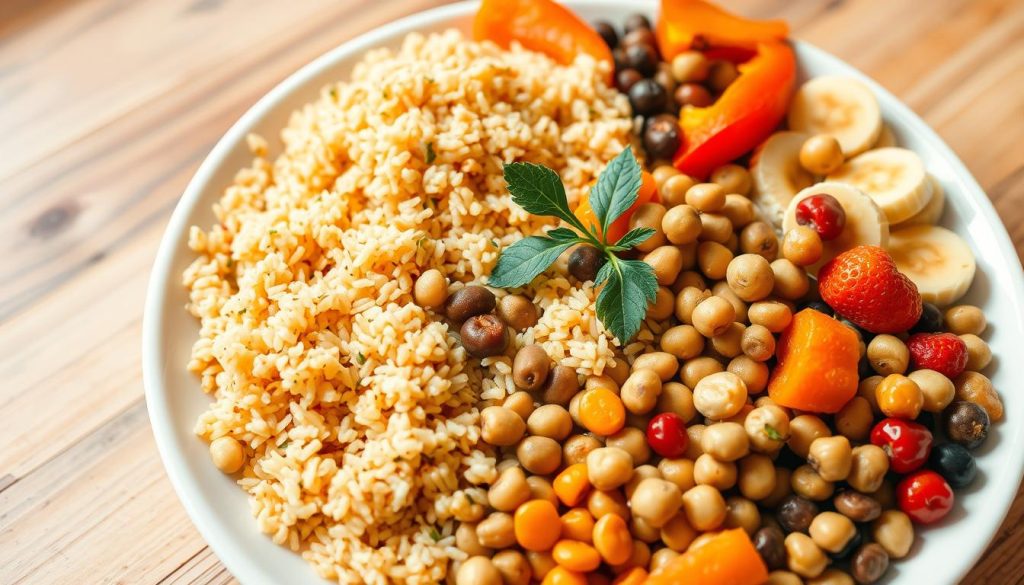
Moderation and mindfulness are key to maintaining a healthy, sustainable carbohydrate intake. By being mindful of portion sizes and tuning in to your body’s signals, you can strike the right balance to fuel your energy and support your overall wellbeing.
Sugary Snacks: A Source of Simple Carbohydrates
Sugary snacks and processed foods high in simple carbs give quick energy. But, they can cause energy crashes and health issues. It’s vital to know how these simple carbs affect us and find better energy-boosting snacks.
Simple carbs in sugary snacks quickly raise blood sugar. This energy boost then drops sharply, making you feel tired. Eating these simple carbs can mess with your energy balance, causing energy crashes and hunger.
On the other hand, complex carbs in whole grains, fruits, and veggies give steady energy. These healthy energy snacks also have vitamins, minerals, and fiber, boosting your health.
| Sugary Snacks | Healthy Energy Snacks |
|---|---|
| Cookies, candies, and other processed sweets | Nuts, seeds, fresh fruit, yogurt, and whole grain crackers |
| Provide a quick burst of energy from simple carbs | Offer sustained energy from complex carbs, protein, and healthy fats |
| May lead to energy crashes and cravings | Support steady energy levels and overall health |
Choosing healthy energy snacks over sugary snacks helps keep energy stable. It avoids energy crashes and supports health. Remember, balance is key in a healthy diet with carbohydrate-rich foods.
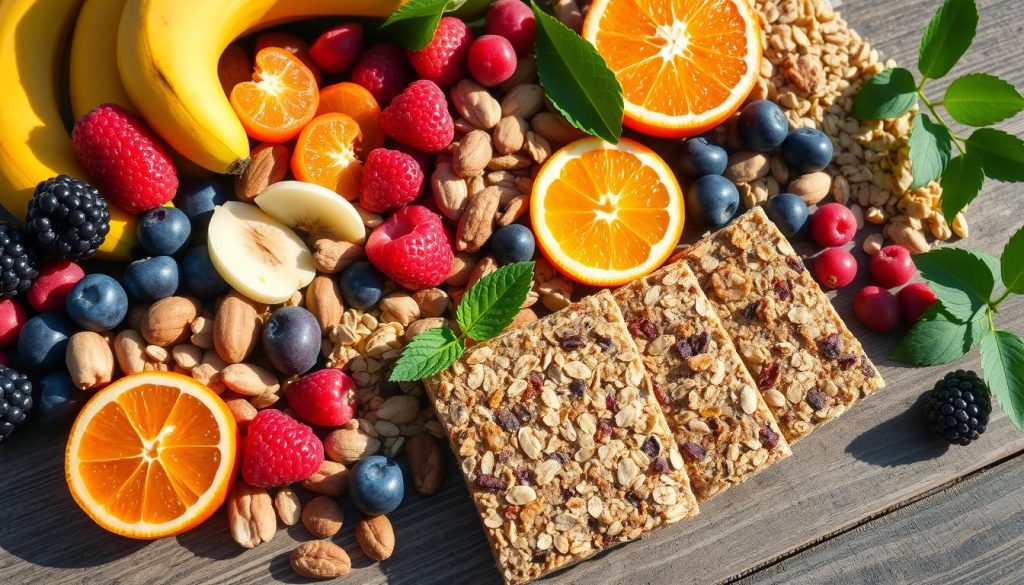
Pre-Workout and Post-Workout Carbohydrate Fueling
For athletes and active people, the right carbs at the right time are key. They help boost energy and support performance. Using the right carbs before and after working out can help you reach your fitness goals.
Before you start, pre-workout carbs give you a quick energy boost. Choose easy-to-digest foods like fruit, sports drinks, or energy gels. These carbs for athletes help you stay strong and focused during your workout.
After your workout, post-workout carbs are crucial for refueling and muscle recovery. Whole grain breads, brown rice, and starchy veggies like sweet potatoes are great choices. They help your body recover and get ready for the next day.
- Timing your carbohydrate intake around your workout is key for optimal energy and recovery.
- Pre-workout carbs provide a quick energy source, while post-workout carbs help replenish glycogen stores.
- Choose nutrient-dense, complex carbohydrates for sustained energy and better overall health.
“Carbohydrates are the body’s primary fuel source, and strategic timing of their intake can make a significant difference in athletic performance and recovery.” – Sports Nutritionist, Jane Doe

Adding pre-workout and post-workout carbs to your diet can boost your energy and recovery. This supports your fitness journey and helps you perform better.
Energy-Boosting Meals and Snacks
Keeping your energy up all day is key for an active life. Eating meals and snacks rich in carbs can fuel your body. This keeps you energized and ready to go.
Quick and Healthy Carbohydrate-Rich Snack Ideas
Need a quick energy boost? Try these snacks:
- Whole grain crackers with hummus or nut butter
- Apple slices with cinnamon and honey
- Greek yogurt with berries and granola
- Trail mix with nuts, seeds, and dried fruit
- Whole grain toast with avocado and salt and pepper
These snacks give you carbs for energy. They also have fiber, protein, and healthy fats. These nutrients support your health and well-being.
| Snack | Carbohydrate Content (grams) | Additional Nutrients |
|---|---|---|
| Whole grain crackers with hummus | 20-25 | Fiber, protein, healthy fats |
| Apple slices with honey | 15-20 | Fiber, vitamins, antioxidants |
| Greek yogurt with berries and granola | 25-30 | Protein, fiber, vitamins, minerals |
| Trail mix | 20-25 | Fiber, protein, healthy fats, vitamins, minerals |
| Whole grain toast with avocado | 20-25 | Fiber, healthy fats, vitamins, minerals |
Adding these meals and snacks to your day helps keep your energy up. It supports an active lifestyle.
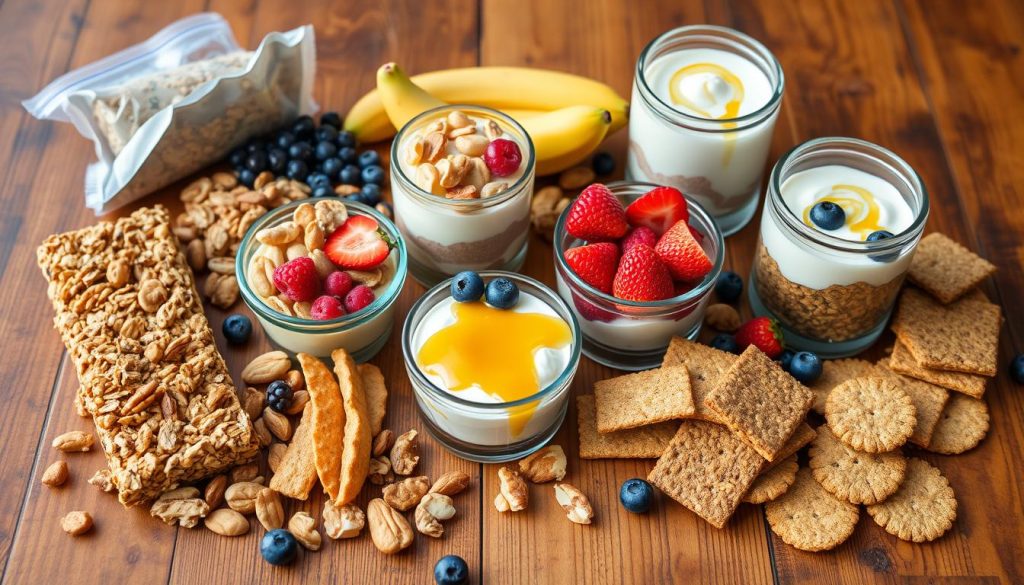
Carbohydrate Needs for Athletes and Active Individuals
Athletes and those who are active often need more carbs. This is because carbs are the main fuel for the body during exercise. Having enough carbs is key to keeping energy up, avoiding fatigue, and doing well in sports.
Carb-loading is a method used by endurance athletes. They eat more carbs before big events. This fills up their glycogen stores, which are used for quick energy during the event. Carb cycling is another method. It involves switching between high and low carb days to match energy needs.
Athletes and active people need a lot more carbs than those who sit a lot. The exact amount depends on several things. These include the type and length of exercise, body size, and how much energy is used. Generally, active people should eat 3 to 12 grams of carbs for every kilogram of body weight each day. Endurance athletes might need the higher amount.
Eating a variety of carbs is important for athletes and active people. Foods like whole grains, starchy veggies, legumes, and fruits are good. They give energy and also have vitamins, minerals, and fiber that are good for health and performance.

Knowing how carbs are important for active people helps. Using carb-loading and carb cycling can improve energy, performance, and health. It’s all about supporting your body and doing well in sports.
Conclusion
Carbohydrate-rich foods are key for lasting energy and good health. Knowing the difference between complex and simple carbs helps you choose better. This knowledge lets you pick the right foods for your diet and health goals.
Whole grains, starchy veggies, legumes, and fruits are full of nutrients. They give your body the fuel it needs. Adding these foods to your meals and snacks keeps your energy up. It also supports your physical activities and a healthy lifestyle.
Finding the right balance of carbs is important. Watch your portion sizes and listen to your body. This way, you get the most from carbs without eating too much. By focusing on carbs, you’ll have more energy and stay healthy.
FAQ
What are the main types of carbohydrates?
Carbohydrates are divided into two main types. Complex carbs, or “good” carbs, include whole grains, starchy veggies, and legumes. Simple carbs, or “bad” carbs, are added sugars, syrups, and refined grains.
Why are carbohydrates important for energy?
Carbs are the body’s main energy source. They break down into glucose, which cells use to make ATP. ATP is the cell’s energy currency. Carbs fuel physical activity and support the body’s functions.
What are the best sources of complex carbohydrates?
The best complex carbs come from whole grains like oats, quinoa, and brown rice. Starchy veggies like potatoes and sweet potatoes are also great. Legumes, such as beans, lentils, and chickpeas, are packed with nutrients.
How can I incorporate more carbohydrate-rich foods into my diet?
To add more carbs to your diet, try these ideas. Choose whole grain breads, pasta, and cereals. Add starchy veggies like potatoes and sweet potatoes to meals. Legumes like beans and lentils are great in soups and salads.
Snack on fruit for natural simple carbs. Try new whole grain dishes like quinoa and bulgur.
What are the benefits of eating carbohydrate-rich foods?
Eating carbs offers many benefits. They provide sustained energy and improve physical performance. They help manage blood sugar levels and increase fiber intake.
Carbs reduce the risk of heart disease and type 2 diabetes. They also support brain function and cognitive abilities.
How much carbohydrate should I consume per day?
Daily carb intake varies based on age, activity level, and health. The Dietary Guidelines suggest carbs should be 45-65% of your calories. Focus on complex, nutrient-dense carbs over simple or refined ones.
What are some quick and healthy carbohydrate-rich snack ideas?
Here are some quick, healthy snack ideas. Try whole grain crackers with hummus or nut butter. Fresh fruit with yogurt is also good.
Carrot or celery sticks with guacamole make a great snack. Roasted chickpeas or edamame are tasty. Overnight oats or chia pudding are nutritious options. Whole grain granola bars or trail mix are convenient.
How can athletes and active individuals optimize their carbohydrate intake?
Athletes and active people need to plan their carb intake. Eat carb-rich foods before and after workouts to refill energy stores. Increase carbs on high activity days or during training.
Try carb-loading to boost glycogen stores. Include a variety of complex carbs like whole grains, fruits, and veggies.


